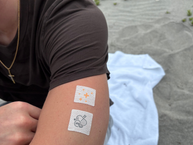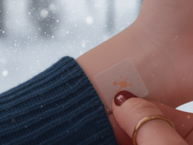Bariatric surgery patients know that vitamins and minerals are important after surgery, but how much do you know beyond that? Do you know why you need to take bariatric vitamins for life, and how much you need to take? Are you familiar with the benefits of bariatric surgery vitamin patches and how much easier they can make it for you to take your vitamins after surgery?
Vitamin and mineral needs of bariatric surgery patients are high, but bariatric surgery vitamin patches can help. They can contain a higher amount of vitamins and minerals, and have a wider range of nutrients, than many pills and other multivitamins that you may find on the market. Be sure to ask your doctor or surgeon before taking any type of vitamin, mineral, or other supplement.
Why Bariatric Surgery Patients Need to Take Vitamins and Minerals
Why is it so important to take vitamins and minerals after bariatric surgery? Nutrient deficiencies are rampant after surgery. There are several reasons why bariatric surgery patients are at risk for deficiencies. These are some of them.
- You eat less after surgery. That’s a good thing because eating less is what lets you lose weight. But along with calories, food has nutrients! When you eat less of it, you get less of those nutrients. That means you’re getting less of important vitamins and minerals from your food.
- You may be eating less variety after surgery. Eating a variety of foods is what lets you get a variety of nutrients. But, bariatric surgery patients may be limiting the types of foods they eat. That’s a good thing when you’re talking about eating fewer sweets and fried foods, for example. But if you’re eating fewer dairy products because of a newly developed lactose intolerance, or you’re skipping out on whole or fortified grain products due to a low-carb diet, you’re taking in fewer vitamins and minerals than you were before.
- You may experience malabsorption from your bariatric surgery procedure. The gastric bypass and duodenal switch procedures, for example, are considered malabsorptive because they interfere with nutrient absorption in the body. That’s helpful for weight loss because it reduces the calories your body gets from food, but a side effect is reduced absorption of vitamins and minerals.
- There may be higher needs for some vitamins and minerals as a result of your surgery or weight loss. For example, rapid weight loss, such as you are likely to experience after bariatric surgery, is linked to a loss of calcium in the body and an increased risk for lower bone density. That means bariatric surgery patients need more calcium than they did before surgery.
Most bariatric surgeons and nutritionists say the need to take bariatric vitamins isn’t short-term. Instead, their patients should take vitamin and mineral supplements for life. Bariatric surgery vitamin patches are an easy solution for this, as long as your healthcare provider agrees.
Common Vitamin and Mineral Deficiencies of Bariatric Surgery Patients
Bariatric surgery patients should take a multivitamin at the least, but there are certain vitamins and minerals in particular that tend to be deficient in bariatric surgery patients. Here are some of them.
|
Micronutrient
|
Functions and/or Deficiency Symptoms
|
|
Calcium
|
Needed for strong bones and proper nerve and muscle function. Deficiency can lead to osteoporosis and an increased risk for fractures.
|
|
Vitamin D3
|
Needed to let your body absorb and use calcium, as well as promote normal immune system and heart health. Deficiency can lead to lower bone mineral density, and it’s linked to cognitive decline and heart disease.
|
|
Thiamin (Vitamin B1)
|
Need for proper nutrient metabolism and energy production in your body. Deficiency can cause leg pain and swelling, or fatigue and shortness of breath.
|
|
Folate
|
Needed for heart health and normal red blood cell formation. Deficiency can lead to anemia and increased risk for heart disease, not to mention risk for neural tube defects if you are planning to become pregnant or already are.
|
|
Vitamin B12
|
Needed for normal metabolism and normal red blood cell formation. Deficiency can cause anemia and heart disease risk, as well as nerve damage that can be permanent.
|
|
Vitamin C
|
Needed for iron absorption, especially if the iron is from supplements, and for normal immune system function, antioxidant function, and collagen formation for healthy joints and cartilage. Deficiency can lead to increased infections and bleeding.
|
|
Iron
|
Needed for proper formation of healthy red blood cells to carry oxygen to the cells in your body, as well as for normal immune function. Deficiency can make your nails brittle, as well as cause fatigue, shortness of breath, and increased infections.
|
|
Vitamin A
|
Needed for healthy vision and a strong immune system. Deficiency can lead to poor night vision and scaly skin.
|
|
Zinc
|
Needed for proper wound healing and a healthy immune system. A deficiency can lead to hair loss and increased respiratory or other infections.
|
There are additional vitamins and minerals that bariatric surgery patients may need. That’s why a bariatric surgery vitamin patch formulated according to guidelines from the ASMBS may be the easiest choice to get all of them.
Choosing Vitamin and Mineral Supplements for Bariatric Surgery Patients
There are many choices for vitamin and mineral supplements after bariatric surgery. When choosing your bariatric multivitamins, it’s critical to get a supplement that has the amounts of different vitamins and minerals that are recommended by the ASMBS (American Society for Metabolic and Bariatric Surgery).
That means that not just any bariatric vitamin will do. A standard multivitamin is too low in many of the nutrients that are considered at risk for bariatric surgery patients. Even some of the ones marketed for bariatric surgery patients do not have the recommended amounts of all of the vitamins and minerals that are necessary. Some multivitamins are actually just that - multivitamins. They don’t even have minerals in them!
Oral Bariatric Vitamin and Mineral Supplements
There are many oral bariatric vitamins you can take. There are capsules, chewable tablets, and liquids. Some of them are formulated according to ASMBS standards, but some aren’t. If you want to take a supplement by mouth, these are some things to remember.
- Calcium should be taken separately from iron because they compete for absorption.
- You will need to read the label or ask your surgeon or nutritionist whether you’re supposed to take one, two, or more doses daily, and when to take them.
- You will need to find out whether to take these supplements with food or without food.
When you take vitamins and minerals for bariatric surgery patients in a capsule or other oral form, you need to swallow them. That means:
- It can be problematic if you have a sore throat or esophagus after your bariatric surgery procedure.
- You may have trouble swallowing or have an especially sensitive gag reflex after surgery.
- Side effects related to vitamin and mineral supplements are often related to digestion and absorption. Nausea, constipation, and diarrhea are sometimes reported.
Talk to your healthcare provider when choosing a supplement. You and your provider may decide that bariatric surgery vitamin patches are a more realistic choice, especially since taking your vitamins is a lifelong requirement after surgery.
Bariatric surgery vitamin patches are an alternative to taking vitamin pills after surgery. PatchAid Vitamin Patches are formulated according to ASMBS standards. They meet or exceed the amounts that are recommended by the ASMBS.
Instead of taking many pills, you may be able to meet your needs using one patch, such as the Multivitamin Plus Patch with Iron or the Multivitamin Plus Patch without Iron. If it turns out you do need extra amounts of certain nutrients, there’s no problem. PatchAid Patches are designed to be safe when used together, as long as your doctor agrees. You may need, for example, additional calcium or vitamin D3 from the Calcium/D3 Patch, or your doctor may want you to take a separate iron supplement, such as in the Simply Iron Patch. The Vitamin B12 Patch is another one designed to meet bariatric surgery patients’ needs.
Bariatric surgery vitamin patches are super easy to use. You don’t have to worry about timing of when you use the patches compared to when you have meals or have fluids. Just use them when it’s convenient for you. Apply your patch and take it off up to eight hours later. That’s it!
To apply your PatchAid Vitamin Patch, find an area of skin that has no hair. Clean it well and dry it. Then peel off the back of the patch and apply the patch to your skin. It should stick for the entire time you are using it. You can exercise with it on, since it’s flexible. It’s even designed to be sticky if you take a shower.
Another benefit of bariatric surgery vitamin patches is that you don’t have to worry about side effects related to digesting and absorbing the nutrients. At a time when you may already be experiencing stomach issues related to surgery, that can be welcome news. You probably don’t want to deal with additional issues if you don’t have to!
Since bariatric surgery vitamin patches are absorbed transdermally, there is no digestion and absorption involved. The nutrients go across your skin right into the bloodstream.
Do Nutritious Foods Still Matter?
Nutritious foods still matter, even if you are getting a big dose of micronutrients in your bariatric surgery vitamin patch. There are a few reasons for this.
- You’re building habits for a lifetime of healthy eating and living. That includes choosing nutritious foods.
- Nutritious foods don’t just give vitamins and minerals. They have nutrients such as protein and fiber that you don’t get from patches. They can also have nutrients such as antioxidants and phytonutrients that may not even be identified yet. Whole grains, vegetables, and fruit are packed with likely beneficial compounds.
- Choosing nutritious foods means having less of low-nutrient, high-calorie foods, such as sugary foods and fatty foods. That means you are more likely to lose weight and hit your goals.
If you are interested in getting more antioxidants and other nutrients, you can still ask your doctor about additional patches. The Glutathione Plus Patch and the Coenzyme Q10 Patch, for example, are rich in antioxidants.
Patches to Support Bariatric Surgery Patient Vitamin and Mineral Needs
Overall health, and optimal nutrition, go beyond getting your vitamins and essential minerals. There are other compounds that can help. And, you may have other health concerns that you are supporting. There may be bariatric-friendly patches that can help with that.
These are some of the common concerns that bariatric surgery patients have, and some patches that are formulated to address them.
- Weight loss. Whether you want to boost metabolism or support a low-carb keto diet, patches such as the Keto BHB Patch, Garcinia Cambogia Patch, Carb Neutralizer Patch, and Slim Trim Appetite Suppressant Patch are available.
- Joint health. To stay active and reduce pain, you need healthy cartilage. The Glucosamine Chondroitin Patch has ingredients that support collagen formation, which is linked to the cushioning in your joints. The more active you can be, the easier it will be to burn more calories, get healthier, and lose more weight.
- Brain and memory support with a Focus and Clarity Patch, or the Omega-3 Vitamin Patch.
- Sleep and energy, such as with a Sleep Aid Patch or a B12 Energy Plus Vitamin Patch.
Ask your healthcare provider which additional vitamin patches may be right for you as you work towards your health and weight loss goals. You work hard, so you deserve all of the support you can get.
Getting your bariatric vitamins for life can help you stay healthy, have normal metabolism and energy, and lose the weight you want to. Bariatric surgery vitamin patches can help meet your needs. They are easy to use and formulated specifically for weight loss surgery patients. Talk to your healthcare provider as you select a bariatric vitamin and before taking any dietary or nutritional supplement.







